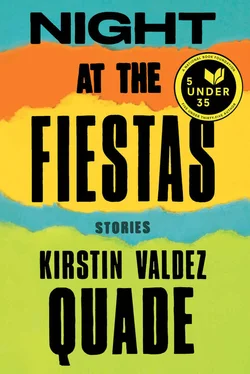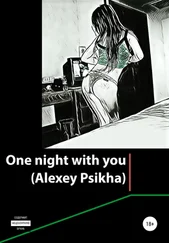She stands before Manuel in her bare feet. The old man sets the paper plate in the dirt beside his chair, then gestures, impatient. She takes a step closer. Her face is stony; she looks away from Manuel to, it seems, a spot across the road in the Romeros’ yard. Manuel leans forward.
Amadeo is still watching when his daughter lifts her shirt above her belly, then higher.
Her breasts are too big for the black lace bra, her maternity jeans low. Her belly glows red in the sunset, impossibly round and swollen. Amadeo sees her belly button protruding and remembers the same thing with Angel’s mother, how toward the end he’d tongue the lump of it while he touched her down there.
Angel doesn’t blink.
Manuel extends a gnarled brown hand, places it against her belly. Reaches out with the other. Cups her belly in both his hands, moves them over the surface of it. Angel stares at the Romeros’ yard.
Amadeo could go outside now, put a stop to the terrible thing that is happening, but he stays, one hand touching the pink lace. His legs are weak. When the old man closes his eyes, so does Amadeo.
ON THIS LAST NIGHT, he is supposed to stay awake, walking outside through the Garden of Gethsemane, thinking about his soul and about salvation. He is supposed to fast, to steel himself, to be betrayed, to hear the cock’s crow. In houses all over town, hermanos are on their knees, leather thongs bound around their thighs, murmuring about suffering and gratitude, yearning for pain.
But Amadeo focuses on the sick sensation of his dick in his jeans, on willing it to shrivel up and fall off as the scene replays in his head: Manuel’s hands on his daughter’s body. Pacing the length of his room, he finishes a six-pack, then moves on to the next, and the image still won’t dissolve.
The television is off, the house silent. In the living room, Angel sits on the couch, staring at the wall. She doesn’t look up at him. “He’s not gonna tell. You can have your Jesus day.”
“I never asked you to do that. I never asked you for nothing.” His voice wavers.
Angel sighs. “It doesn’t matter.”
He can’t tell if she believes this or if she is saying it for him, and he doesn’t know which is worse. Angel points the remote at the TV, and the bright sound of a commercial floods the room. “Just forget about it, okay?”
“I never asked you to do that.” It’s a plea, too quiet to hear over the sound of the television.
Amadeo realizes he’s drunk.
“We can’t be fighting.” She pats the couch, glances quickly at him. “Look, it’s Law and Order .”
Amadeo hesitates, then drops beside her, grateful, exhausted. He takes a handful of chips when she passes him the bag, thinking about the new feeling swelling in him: he’s warm and swaddled, buoyed by forgiveness, suddenly too tired to sleep, too tired to move. They watch the show together, then a second and a third, until Angel goes to bed.
AMADEO WAKES TO ANGEL calling him and the sun streaming through the window. Good Friday.
They gather at the base of Calvario. Nearly two miles to the top, and Amadeo will walk barefoot, dragging the cross. He trembles and his upper lip sweats, though the morning air is cool. The hermanos help Tío Tíve unload the cross from the bed of his Ford, three of them sharing the weight. All the Lenten preparations are for this: the hermanos have washed their white pants, braided their disciplinas the old way, from the thick fibers of yucca leaves, mended rips in the black hoods they will wear to insure their humility in this reenactment. When the pito sounds three times — the cock’s crow — Tío Tíve steps forward, Pontius Pilate giving his sign, and the hermanos seize Amadeo.
It starts as acting, soft punches, and then they’re slugging him, tearing at him, shouting the worst curses of two languages and two thousand years. Amadeo splutters and cries out under the barrage, surprised that it is actually happening.
When they fall back, Tío Tíve places the crown of thorns on Amadeo’s head. Amadeo turns and hoists the enormous cross onto his right shoulder, stooping under the weight, and the procession starts. The hermanos walk in two lines behind Jesus and begin to whip themselves. Manuel Garcia follows, bearing no load except his own hands, and then the women and children, the bright clattering colors of them, so distinct from the neat dark and white of the hermanos. Amadeo cannot see her, but he knows Angel is there.
After the first mile, the cross grows heavy. He tries to get into the part. He was up all night, he tells himself, in the garden, crying out to God. He remembers to stagger: his first fall. The crown of thorns is pulled tight, so it pierces the skin at his temple, and the stinging sweat slides down, but Amadeo is just not feeling it. He’s too heavy and slow, his brain hung over and filled with static.
Angel comes up alongside her father on the right, panting in her sneakers and tank top. “Shoot. I can’t believe I’m hiking at eight months. This must be a record.” She pats her belly. “Your mama’s breaking the Guinness world record, baby.” She swigs water, holds the bottle out to Amadeo. “Want some water? I got water.”
Amadeo shakes his head fiercely and heaves the cross up the slope after him, wishing she’d leave him alone, wishing he didn’t owe her. He can pay her back, but only if he can blot her out.
Manuel Garcia hobbles his way up the procession on the left, huffing and stinking like a dying man. Amadeo stumbles; Manuel Garcia wheezes laughter. The old man will turn back — he’ll have to turn back — and leave the day to Amadeo.
Manuel leers past Amadeo at Angel and spits, “Puta.”
Angel looks up, startled, then to Amadeo. “Dad—”
Rage wells in him — Amadeo nearly drops the cross and bludgeons the old man — but then turns inward. He calls between heavy breaths to the hooded men behind him, “Whip me!” And then, because they do not respond, louder, “Whip me!”
When the lashes come, Angel clamps her hands over her mouth.
Amadeo grinds the soles of his feet into the sharp stones, scrapes his shoulder under the edge of the cross. He feels the rough wood break skin, the hot blood rise, his own blood, his own heat. He must leave his body, become something else.
Manuel laughs so hard he begins to cough, spits in the dirt under Amadeo’s bare feet. Suddenly it comes to Amadeo: this mockery is a gift! The filthy old man is playing his part and doesn’t even know it. Amadeo laughs out loud, tears streaming down his cheeks. He’s getting stronger on Manuel Garcia’s mockery!
And Angel isn’t a distraction — she’s the point ! Everything Jesus did He did for his children!
“Get away from me,” Angel yells at Manuel. Her eyes redden and well with angry tears. “Leave me alone!”
“Just wait,” Amadeo whispers, but she doesn’t hear.
His second fall is not intentional; neither is his third. He has forgotten to pick up his feet, and he stumbles over a numb knot of foot, the cross crashing down with him.
Angel kneels beside him, her eyes worried, Manuel forgotten. “You gotta have water.” She opens the little plastic top and pushes the bottle into his hands, but he doesn’t take it.
In the brush, birds chirp and little lizards dart, then freeze, from rock to rock. He watches Angel follow one with her eyes. Inside her, the baby twists and turns — he can almost sense it — hot in her flesh and under the sun. For the first time he’s glad she’s here: more than anyone, he realizes, she’s the one he wants with him today.
At the top of Calvario, the hermanos lift the cross from his shoulders and rest it on the ground. Amadeo straightens, and the word good thrums in his head with each step: good, good, good. The hermanos help him down, position his arms along the crossbeam, his feet against the block of wood that is all he’ll have to stand on. Amadeo spreads his arms and looks up into wide blue sky; there is nothing in his vision but blue. As they bind his arms and legs against the wood, lines once memorized surface: With a word He stilled the wind and the waves. But the wind skates over his body, drying the sweat and blood at his temples.
Читать дальше












